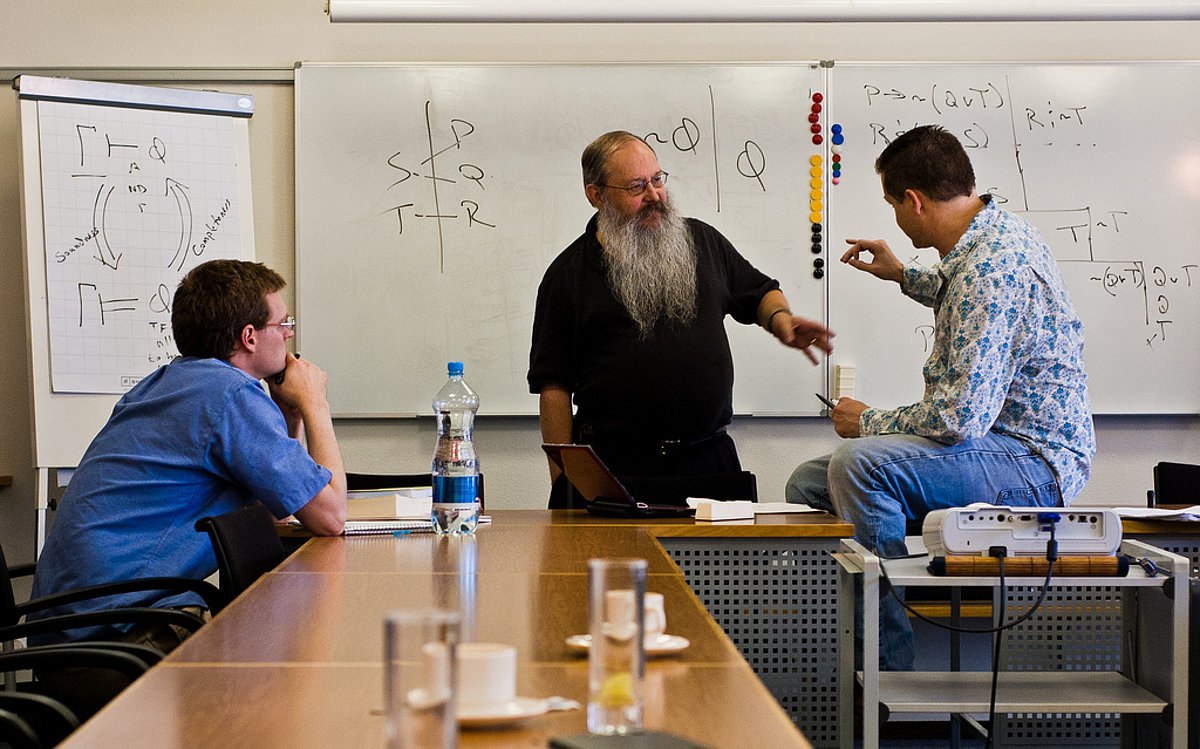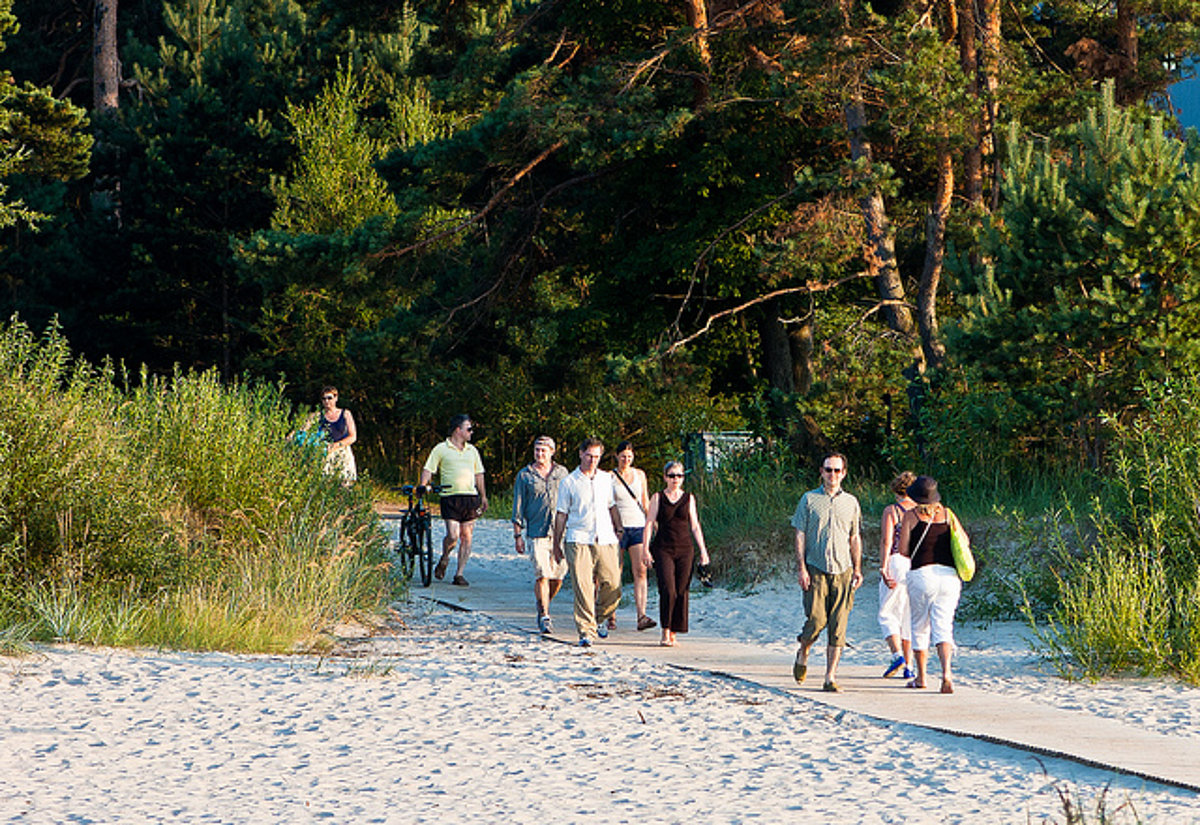
Ten days at the Summer School passed in very intensive work for the twenty students from Latvia, the Czech Republic, America, Canada, Great Britain, Italy, Russia, Finland, Germany and Sweden. This year, the participants of School were two postdoctoral studies representatives and PhD students, specializing in areas directly linked to Prof. Brandom’s developed topics in philosophy, as well as, a couple of MA students. The students represented Helsinki, Cambridge, Oxford, Calgary, Manchester, Berlin, and other universities. The University of Latvia representatives were BA Philosophy student Marta Turkopule and MA Philosophy student Māris Skujevskis.
This year’s topic was Analytic Pragmatism and its manifestation in semantics and logics. The tutors were the founder of analytical pragmatism Professor Robert Brandom (University of Pittsburgh, USA) himself, as well as his concept followers and developers – Prof. Henry Jackman (York University, Toronto), Prof. David Beisecker (University of Nevada, Las Vegas), and Prof. Mark McCullagh (Ontario).While the themes in a broader context were expanded by the prominent philosopher of logic, Prof. Danielle MacBeth (Haverford College) and one of the leading contemporary semantologists Prof. Michael Glanzberg (University of California, Davis).
Training Centre for Academic Excellence
Robert Brandom is a Distinguished Professor of Philosophy at the University of Pittsburgh, a Fellow of American Academy of Arts and Sciences, the author of many significant monographs and publications, including Making It Explicit: Reasoning, Representing, and Discursive Commitment (1994), Articulating Reasons: An Introduction to Inferentialism (2000), Between Saying and Doing: Towards an Analytic Pragmatism (2008), How Analytic Philosophy Has Failed Cognitive Science (2010) etc. His research interests are focused on pragmatism, semantics, logic<s>s</s>, the philosophy of language and psyche, as well as, the history of ideas of such philosophers as Kant, Hegel, and Wittgenstein. During the week-long Summer School, Prof. Brandom not only read lectures that covered his scope of study (Analytic Pragmatism, Semantic Inferentialism, and Logical Expressivism), but also seminars and discussions, offering students a unique opportunity to gain a more profound insight into one or another aspect of Brandom’s concepts under his guidance, and provided his critical assessment. The students could also find out about the latest and topical ideas in the philosophy of language and cognitive sciences in the context of analytical pragmatism.
Overall, the School’s activities were organised in a way that students were first sent the literature materials to study as their home work. The lectures and seminars were structured thematically, based on the literature under consideration. With the tutors’ (the leading professionals of the area) assistance, students developed various academic competences necessary to attain academic excellence: skills to critically evaluate the research material, to clearly formulate the problem and articulately express their opinion, etc. One of the School’s basic ideas is to develop a high academic writing standard. Consequently, in parallel with the lectures and seminars, students had to write a final paper, in particular, an essay that, in terms of content and style, can be published in an academic journal. Thus, the Summer School can be considered a training centre for academic excellence that promotes the involvement of new scientists in the research process and their integration in the particular sphere on the international level.
Besides the seminars and classes, small symposiums were also organised, where the lecturers introduced students and colleagues with their research and current projects, providing an insight into their university’s research process and organisation. The evenings, besides the planned activities, were spent in many thought-provoking and exciting informal discussions.
Beyond the Usual Frame
This year, the invited Summer School principal was Prof. Henry Jackman, who completed a dissertation under the guidance of Prof. Brandom at the University of Pittsburgh. When describing the general concept of the Summer School, he pointed out that its key task is to build a bridge between North America’s prestigious PhD programmes in Philosophy and the general academic environment represented both by students and teaching staff. Prof. Jackman also remarked that the organization of summer schools is not a customary practice in the USA, and he has not only gained a valuable experience, but also a conviction that it is necessary to organize such activities. First of all, these schools give an opportunity for students, young and experienced researchers with common research interests, to come together.
It is important that the selected themes of the Summer School are linked to contemporary philosophy and other related spheres, and refer to topical discussions on current issues. Another positive feature is that the Summer School participants come from different countries, and represent different universities, accordingly, their training, qualifications and experience differ<s>s</s>. This diversity gives a new look at the explored topic, as well as, allows viewing things from a different perspective. Prof. Jackman notes that by studying at one’s faculty, or representing a certain school, we not only acquire methods of working with research material, but also learn to distinguish most significant arguments and issues. Subsequently, it is very healthy for anyone who acquired academic skills and knowledge according to one specific tradition at a certain school to see what and how others are doing it, in order to look at it beyond the usual frame; thus, gaining an extensive experience.
Future Outlook
This year the Summer School focused on the University of Pittsburgh and the representatives from Pittsburgh headed by Prof Brandom. Last year, the accent was on the Brown University research topicalities, with the distinguished researcher of the philosophy of psyche, Prof. Jaegwon Kim as key participant. The theme was Mental Causality and Reductive Explanation, exploring the ways the psyche influences the body and how they interrelate. Whereas 2011 will be the Princeton University year. When talking about the next year’s Summer School and its general conception, the Centre for Cognitive Sciences and Semantics Director, Jurģis Šķilters, indicates: “The aim of the Summer School is to every year focus on a basic theme of a certain cognitive science, attaching it to the particular academic tradition or school, where it originated. Accordingly, next year, students will have an opportunity to cooperate with the Princeton University Professor Gideon Rosen and other notable philosophers and representatives of cognitive sciences on the theme Content in the Language and Psyche. And in 2012, we will turn to communications, the point of contact between language and cognitive science, including the relevance theory, to be presented by its founder Dan Sperber from Paris.”
Post Factum
Looking back at her time at the Summer School, Marta Turkopole, BA Philosophy student at the UL, said that she gained a very interesting and valuable experience from different aspects. Firstly, she was positively surprised by the way the lectures are organised, and the material under consideration is approached, and by the fact that the lectures are held by high-level tutors. A very wide range of literature and the most topical issues of the philosophy of language are looked at. Secondly, it is very valuable that the participants of the Summer School represent so many different universities and countries. This gives an opportunity to broaden one’s horizon, as very exciting exchange of experience takes place, and an insight is gained of what happens in other universities. Marta also indicated that the benefits of the Summer School are several new ideas that she plans to utilize when writing her BA paper.
Among the Summer School participants were also Monika Kreile, who has received a BA degree at the Manchester University, and will commence MA Linguistics studies at the Oxford University, as well as, Pietro Salis, a postdoctoral study representative from the Calgary University. Monika pointed out the interdisciplinary focus as one of the Summer School’s pluses. Despite the fact that up till now she has not considered analytical pragmatism as a certain viewpoint on the language in her studies, and has not explored why a positive communication takes place and why it happens at all; the school gave her the opportunity to look at the language from a different perspective, beyond the usual linguistic frame, as well as, to find out the points of contact between philosophy and linguistics. Pietro emphasised the great personal growth and gains related to his research work. First of all, he noted that it really was a unique opportunity to spend ten days in intensive work with Prof. Brandom and other distinguished tutors, especially, as he is interested in the correlation between semantics and modal inferentialism. It was also a valuable opportunity to present his research work, and test it in front of a very knowledgeable and well-prepared audience.
Background
The UL Faculty of Social Sciences Centre for Cognitive Sciences and Semantics was founded in 2005 (until 2010 it was situated at the Faculty of History and Philosophy) and is in charge of organising interdisciplinary research, conferences, summer schools, symposiums and other activities.
Translated by students of the professional study programme Translator of the University of Latvia.
Translated by students of the professional study programme Translator of the University of Latvia.

 CONFERENCE
CONFERENCE